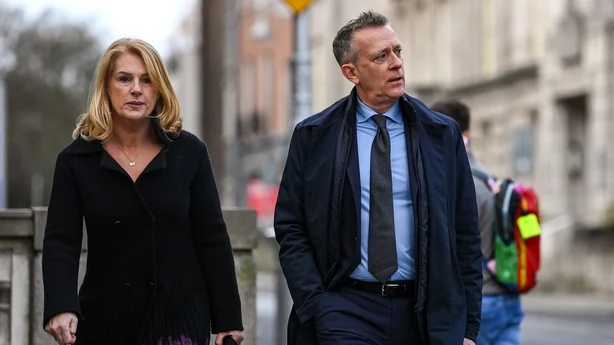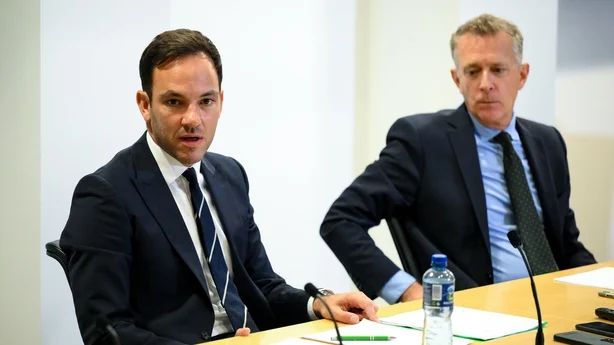Upheaval at the Football Association of Ireland once again. After serving three-and-a-half years of a five-year stint, Jonathan Hill will depart his role as CEO on 30 April, or early April as they presumably term it in Abbotstown.
Hill, a marketing guru, is set to leave with the FAI still having no permanent men's team manager, no marketing and communications director, and only having just finally secured a main men's team sponsor after four years without one - which, in the end, turned out to be the already existing sponsor of the women's team.
The Yorkshireman was appointed in 2020 in the wake of Irish football's greatest ever crisis, the association having run up €70 million in debts by the end of 2019, requiring a government bailout and financial assistance from UEFA to stave off liquidation.
In his previous life, Hill attracted notice as the marketing manager of Euro 96, supposedly responsible for the 'Football Comes Home' slogan, which Baddiel and Skinner then ran with. As the FA's commercial director in the 2000s, he doubled their commercial income during a five-year cycle in charge.
His non-Irishness and detached technocratic bearing was regarded as a positive among the politicos who took an interest, sparking memories of your Ajai Chopras and your Matthew Elderfields from their own sphere. The perfect corrective to the local populist strongman who had run things into the ground.
Better that than recruit from within the warring factions of Irish football, where everyone prominent seemed to hate each other for some petty, historical reason.
His aloofness extended to living in London for the entirety of his time in the post, a source of extreme contention among the media, which quizzed him on the matter regularly. This resulted in some cost to the FAI, who had to foot the bill of his travel costs to and from London and a hotel room in Castleknock while he was here.
Hill pleaded that it would be unfair to relocate his children at "this specific point in their education" and instanced the number of Zoom calls he was going on daily, though some on the FAI board found the situation unsatisfactory. Others were content that it made sense.
These travel arrangements formed part of the fateful controversy that broke out last November, when it was revealed he had been paid €12,500 in 2022 in lieu of holidays not taken and another €8,500 in benefit in kind which related to his travel expenses.
Altogether, these payments left the FAI in breach of their 2020 memorandum of understanding with the government which specified that the FAI CEO's pay was not to exceed that of a secretary general of a government department. Sport Ireland suspended funding to the FAI in light of these disclosures, although it was promptly released when Hill agreed to pay back the money.
His fate was sealed during a typically excruciating meeting at the Public Accounts Committee - where many an organisation has had their guts prised open - in February, when FAI president Paul Cooke, having artfully dodged the key question on a few occasions, said his confidence in the CEO "had been challenged" by recent events.

While he leaves in nothing like the extra-special ignominy of his most infamous predecessor, the consensus on his reign is that it has been less than stellar.
Chief among the gripes was the baffling failure to secure a primary sponsor for the men's team for four years.
Corporate Ireland were no doubt unenthused by the team's failure to get within a snowball's of qualifying in the past two campaigns, though it was still perceived as an inordinate length of time for a national side to go without a sponsor.
Finally, in March, it was announced that Sky, women's team sponsor for the previous two and a half years, would be sponsoring both teams until 2028. The deal was unveiled with a conspicuous lack of fanfare and no financial details were reported.
Then, there's the comically exhaustive search for a new manager. Dozens of names have been floated at this stage and most fans have lost the will to speculate. A few left-field candidates have briefly gone odds-on in the bookies, invariably the precursor to them being ruled out of the reckoning altogether.
It was strongly reported that Greece manager Gus Poyet had been offered the job after his side lost the March play-off to Georgia, only for the deal to apparently fall through.
The 42.ie reported that the FAI's strict budgetary requirements were the sticking point, with Poyet unable to bring in his own staff. This harks back to the FAI's original and enduring predicament, which predates Hill's arrival into the CEO role.
As of now, the consensus prediction is that interim manager John O'Shea will simply be elevated to permanent manager, an outcome which would mean that the FAI had spent six months searching for a new gaffer only to appoint a member of the previous backroom staff. This, we stress, is not certain and other names could emerge.
It would broadly tally with the process that eventually saw Eileen Gleeson installed as women's team manager, having spent the previous autumn as interim boss. While Hill was keen to talk up the progress of the women's side during his stint, the handling of Vera Pauw's departure was considered clumsy.
Pauw, sore over her departure, last week characterised the new FAI's credo as "it's more important that we look right than perform right" in an interview with Richie Sadlier.

Prior to their annus horribilis in 2019, scandal and controversy had been regular visitors to Abbotstown and their old headquarters in Merrion Square, so much so they had probably had their own designated conference room.
There was the legendary Merriongate saga of 1996, now the stuff of FAI crisis lore, where it emerged that the late Joe Delaney's curious ticket dealings at the 1990 and 1994 World Cups had resulted in a mysterious ticket tout - given the pseudonym 'George the Greek' - making off with £200,000 of the FAI's ticket money.
Despite concerted efforts, the tout was never tracked down and the whole affair culminated in a famous board meeting in March 1996, where Delaney resigned and President Louis Kilcoyne was removed (the latter probably on account of old antagonisms). Des Casey, Pat Quigley and Michael Hyland all resigned but were subsequently reinstated.
We had the infamous Vantage Club ticket scheme, where Ireland's millionaire class, fresh from the victory paddock at Cheltenham, were casually going to shelve out an eye-watering sum to enjoy deluxe treatment at six games a year at the as yet unbuilt Aviva Stadium against Georgia, Cyprus et al.
Alas, Ireland's millionaire class was about to suffer a severe cull in their numbers over the next couple of years and interest in the scheme could fairly be described as pathetically small.
The €32,000-asking price for 10-year tickets - more than double what the IRFU were charging - comes off now like a ludicrous example of Celtic Tiger hubris, yet it was persevered with for three disastrous years as the Irish economy hit the floor.
This historic mistake stored up a monstrous debt, which was to be at the root cause of so many problems for the game in Ireland.
Then, there were the tumultuous and shocking events of 2019, the mother and father of all FAI scandals. When in a late night court sitting, Judge Anthony Barr ruled that the Sunday Times could report upon John Delaney's 2017 bridging loan to the association.
Thereafter, we had Delaney's brief stint in the makey-up role of Executive Vice-President and his display of the silent treatment to a Dáil committee, while the financial secrets of the organisation pored into the open.
Last year's payments controversy, which ultimately did for Hill, does not exist in the same stratosphere as a controversy.
He hardly leaves as a reviled figure. But rather as a forgettable figurehead who failed to guide the FAI and Irish football out of a chaotic and unhappy period largely not of his making.
Disclaimer: The copyright of this article belongs to the original author. Reposting this article is solely for the purpose of information dissemination and does not constitute any investment advice. If there is any infringement, please contact us immediately. We will make corrections or deletions as necessary. Thank you.






